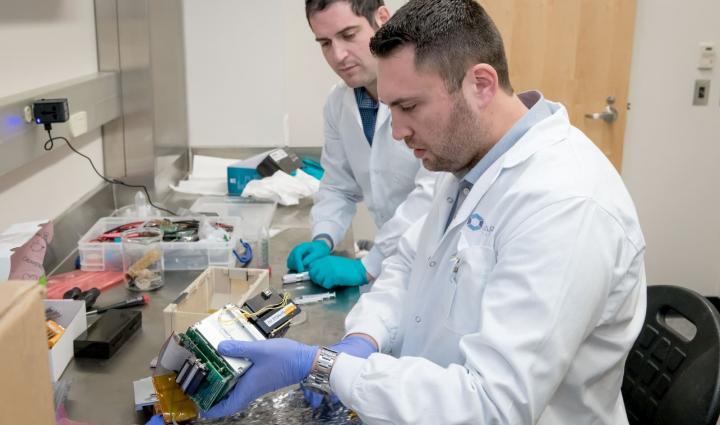On Friday evening, at 19:19 Israel time, a SpaceX Dragon spacecraft successfully splashed down in the waters of the Pacific Ocean – and the four crew members of the Fram2 mission, the first in history to enter a polar orbit around the Earth, were successfully taken out. Together with the crew, a laboratory from the Israeli company SpacePharma was also removed. The laboratory is designed to accelerate crystallization processes in microgravity – with the aim of developing drugs faster and safer.
The Israeli company’s 11th laboratory to go into space
The Fram 2 mission, so named after the famous Norwegian ship that explored the Arctic Circle and Antarctica in the late 19th and early 20th centuries, was launched on April 1st into polar orbit – that is, it was launched from the Kennedy Space Center in Florida not eastward with the Earth’s rotation, but 90 degrees south. For 3 days, 14 hours and 32 minutes, the spacecraft orbited the Earth on this orbit, flying from one pole to the other every 44 minutes.
This is the first time that a manned spacecraft has flown in a polar orbit, and this history has been made by four private citizens: Chun Wang, a 43-year-old Chinese billionaire who made his fortune from Bitcoin mining and now lives in Malta, a 38-year-old Norwegian filmmaker named Jannicke Mikkelsen, a 30-year-old doctoral student in electrical engineering from Germany named Rabea Rogge, who became the first German woman in history to fly into space, and Eric Philips, a 63-year-old Australian polar adventurer.
But the Fram 2 mission also included an experiment using the Space Pharma mobile laboratory. Space Pharma is an Israeli start-up company that specializes in launching miniaturized and intelligent mobile laboratories into space. These laboratories allow scientists to control them remotely – right from their mobile phones. It should be noted that the four crew members conducted 22 different experiments while in space, on behalf of universities, research institutes and space agencies, but Space Pharma's smart lab does not need human intervention. This is Space Pharma's 11th laboratory to reach space, and the first to orbit the Earth on a Dragon spacecraft – without docking at the International Space Station.

"We produce drugs that are not liquid – colloids or suspensions," explains Yossi Yamin, founder and CEO of Space Pharma. "These are crystals that the body can digest under the skin, for example as a nasal spray. And thanks to the microgravity conditions, they can be produced in space at a much higher density, much more than on Earth. This density allows us to engineer a drug for up to three times the delayed release compared to a drug made on the ground. A threefold delayed release is as different from conventional drugs as chalk is from cheese. This means that instead of going to the hospital to receive an infusion once every two weeks, the patient can spray the drug into their nose, by themselves, once every six weeks. It's good for the patient, and it's good for the government health systems: it saves nurses, it saves equipment, and it frees up space in our overcrowded hospitals."
A new drug – within eighteen months
In addition to their higher density, the crystals develop much faster in space, with crystallization time decreasing from one month on Earth to a few days in microgravity.
"The development of a drug takes an average of 12 years," says Yamin. "We want to do it in a year and four months. The development of crystals is accelerated 10 times in space. Specifically, those crystals that flew on the Fram 2 mission had already been in space. The same crystals, and the same laboratory, will fly for the third time in August, and then we will be able to submit those crystals for pre-clinical studies, all when a total of a year and a half has passed. This is a cancer drug that will be more effective, more concentrated and safer to use, and will be sold as a nasal spray instead of as a drug administered by infusion."
Space Pharma has received the support of the Israel Space Agency in the Ministry of Innovation, Science and Technology, and in the past year it has won the prestigious grant of the European Union's Horizon Europe, which operates the European Innovation Council (EIC) accelerator. The $2.5 million grants, as well as 15 million euros at a later stage, are contingent on finding a strategic partner, and Space Pharma is currently examining several options to complete the round.












